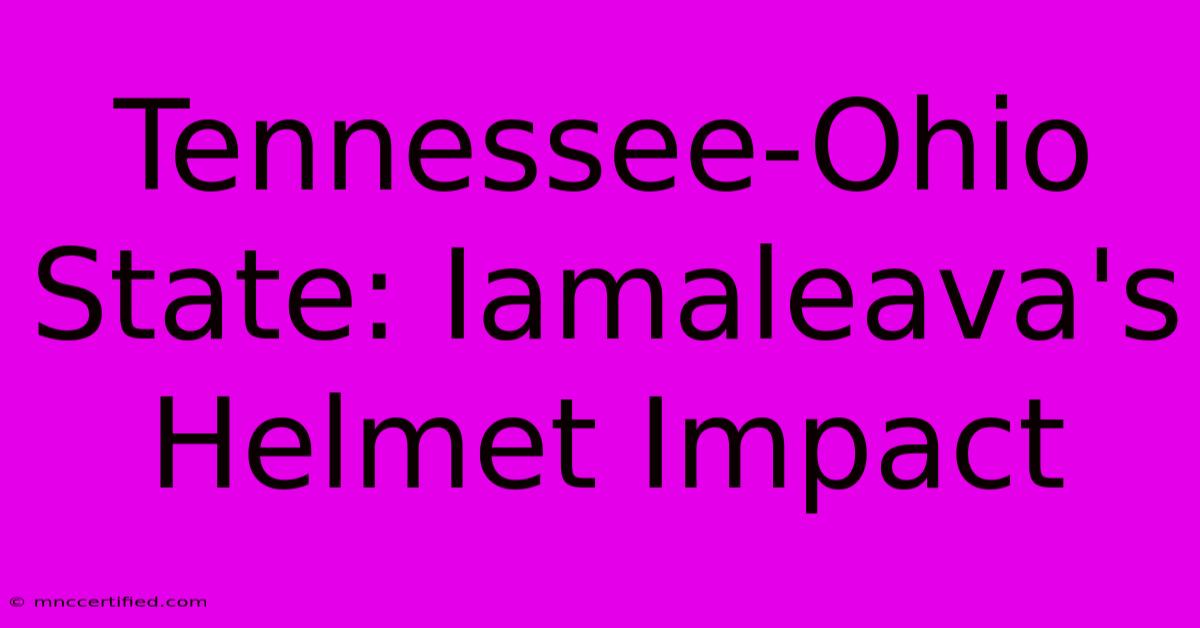Tennessee-Ohio State: Iamaleava's Helmet Impact

Table of Contents
Tennessee-Ohio State: Iamaleava's Helmet Impact – Analyzing the Play and its Aftermath
The Tennessee-Ohio State game, a highly anticipated clash of college football titans, saw its fair share of dramatic moments. However, one play overshadowed much of the excitement: the significant helmet-to-helmet collision suffered by Tennessee quarterback Nico Iamaleava. This article delves into the specifics of the impact, its immediate and potential long-term consequences, and the broader implications for player safety in college football.
The Play: A Devastating Hit
The incident occurred during the [Insert Quarter and Approximate Time of the Game Here] of the game. Iamaleava, in the process of [Describe the play - e.g., a scramble, a pass attempt], took a direct blow to the helmet from an Ohio State defender. [Specify the defender if known]. The impact was clearly forceful, resulting in Iamaleava immediately falling to the ground. The severity of the hit was evident to viewers, prompting immediate concern for the quarterback's well-being. Videos of the play quickly went viral, generating widespread discussion and debate about player safety protocols.
The Immediate Aftermath
Following the collision, Iamaleava was attended to by medical personnel on the field. [Describe the medical response - e.g., He was evaluated for several minutes before being helped off the field, He was taken to the locker room for further examination]. The extent of his injury was not immediately clear, adding to the tension for fans and commentators alike. [Mention if he returned to the game or not]. The reaction from both coaching staffs and commentators emphasized the seriousness of the situation, highlighting the increasing focus on concussion protocols in the sport.
The Broader Implications: Player Safety in College Football
Iamaleava's injury serves as a stark reminder of the inherent risks involved in college football. While the sport has made significant strides in improving player safety, helmet-to-helmet collisions remain a major concern. This incident underscores the need for continued improvements in:
- Rule enforcement: Stringent enforcement of targeting penalties is crucial in deterring dangerous hits. [Discuss specific rule changes and their effectiveness].
- Equipment advancements: Ongoing research and development of improved helmets and protective gear are essential for mitigating the impact of collisions. [Discuss any new helmet technology].
- Education and training: Players and coaches need continued education on proper tackling techniques and awareness of potential dangers. [Discuss the role of coaches and athletic trainers].
- Concussion protocols: Clear and consistently enforced concussion protocols are essential for ensuring the long-term health of players. [Discuss the effectiveness of current protocols].
Long-Term Effects and Recovery
The long-term effects of such a significant head injury are impossible to predict immediately. Depending on the severity of the concussion (if any), Iamaleava may experience a range of symptoms, including headaches, dizziness, memory problems, and cognitive difficulties. His recovery will depend on several factors, including the severity of the injury, his individual response to treatment, and the adherence to strict rest and rehabilitation protocols. [Mention any updates on his recovery, if available].
Conclusion: A Call for Continued Improvement
The Iamaleava helmet impact serves as a powerful illustration of the ongoing challenge of balancing the physicality of football with the imperative of protecting player safety. While the sport continues to evolve, the need for constant vigilance and improvement remains paramount. This event should serve as a catalyst for further discussion and action, aimed at minimizing the risk of such serious injuries in the future. The well-being of college football players should always be the top priority. Further research into helmet technology, rule enforcement, and concussion protocols are crucial steps towards achieving this goal.
Keywords: Nico Iamaleava, Tennessee Volunteers, Ohio State Buckeyes, helmet-to-helmet, concussion, player safety, college football, targeting penalty, football injury, head injury, NCAA football, football safety protocols.
(Note: Remember to replace the bracketed information with specific details from the game. This framework provides a comprehensive structure; filling in the specifics will make it a compelling and accurate article.)

Thank you for visiting our website wich cover about Tennessee-Ohio State: Iamaleava's Helmet Impact. We hope the information provided has been useful to you. Feel free to contact us if you have any questions or need further assistance. See you next time and dont miss to bookmark.
Featured Posts
-
Usyk Vs Fury 2 Predictions Odds Bets
Dec 22, 2024
-
Premier League Predictions More Dropped Points
Dec 22, 2024
-
Nfl Playoffs Ravens Wins Significance
Dec 22, 2024
-
Cousins Benching Highlights Qb Plan Flaws
Dec 22, 2024
-
Senate Approves Social Security Fairness
Dec 22, 2024